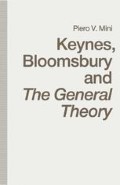Abstract
Between the ages of fourteen and nineteen Keynes spent two-thirds of every year at Eton, a boarding school founded by Henry VI in 1440 with close links to King’s. The way of life of the school, its spirit, philosophy and curriculum, could not but have an impact on Keynes, eventually affecting both the structure and the beliefs of The General Theory. This chapter outlines the basic characteristics of Eton in the closing decades of the nineteenth century, suggesting also some of the most obvious effects on Keynes’s views.
Access this chapter
Tax calculation will be finalised at checkout
Purchases are for personal use only
Preview
Unable to display preview. Download preview PDF.
Notes
Ian Weinberg, The English Public Schools: The Sociology of Elite Education (New York, 1967) p. 108; see also pp. 8 and 47.
Edward Clarence Mack, Public Schools and British Opinion Since 1860 (New York, 1941) p. 210. Maynard’s mother attributed her son’s heart condition, which was eventually responsible for his death, to his participation in Eton’s Wall Game.
Michael Holroyd, Lytton Strachey, vol. i: The Unknown Years, 1880–1910 (London, 1967) pp. 65–7.
Roy Harrod, The Life of John Maynard Keynes (London, 1951) p. 23.
Clive Bell, Civilization and Old Friends (Chicago, 1973) pp. 48–9.
See Plutarch, Life of Fabius in, e.g. The Lives of the Noble Grecians and Romans (Chicago, 1952) pp. 141–54.
John Maynard Keynes, ‘Royal Commission on Lotteries and Betting’ (1932), in The Collected Writings of John Maynard Keynes, vol. xxviii (Cambridge, 1971–9) p. 399.
Havelock Ellis, Studies in the Psychology of Sex, vol. i (New York, 1940) pt 4, p. 322.
Author information
Authors and Affiliations
Copyright information
© 1991 Piero V. Mini
About this chapter
Cite this chapter
Mini, P.V. (1991). Eton and Keynes. In: Keynes, Bloomsbury and The General Theory. Palgrave Macmillan, London. https://doi.org/10.1007/978-1-349-11651-5_2
Download citation
DOI: https://doi.org/10.1007/978-1-349-11651-5_2
Publisher Name: Palgrave Macmillan, London
Print ISBN: 978-1-349-11653-9
Online ISBN: 978-1-349-11651-5
eBook Packages: Palgrave Economics & Finance CollectionEconomics and Finance (R0)

